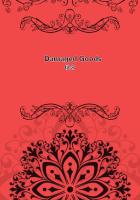In the year 1858 I received a bulky packet bearing the stamp of the Argentine Republic, a realm in which, to the best of my belief, Ihad not a solitary acquaintance. The superscription told me nothing.
In my relations with Rattray his handwriting had never come under my observation. Judge then of my feelings when the first thing Iread was his signature at the foot of the last page.
For five years I had been uncertain whether he was alive or dead.
I had heard nothing of him from the night we parted in Kirby Hall.
All I knew was that he had escaped from England and the English police; his letter gave no details of the incident. It was an astonishing letter; my breath was taken on the first close page; at the foot of it the tears were in my eyes. And all that part I must pass over without a word. I have never shown it to man or woman.
It is sacred between man and man.
But the letter possessed other points of interest - of almost universal interest - to which no such scruples need apply; for it cleared up certain features of the foregoing narrative which had long been mysteries to all the world; and it gave me what I had tried in vain to fathom all these years, some explanation, or rather history, of the young Lancastrian's complicity with Joaquin Santos in the foul enterprise of the Lady Jermyn. And these passages Ishall reproduce word for word; partly because of their intrinsic interest; partly for such new light as they day throw on this or that phase of the foregoing narrative; and, lastly, out of fairness to (I hope) the most gallant and most generous youth who ever slipped upon the lower slopes of Avemus.
Wrote Rattray:
"You wondered how I could have thrown in my lot with such a man.
You may wonder still, for I never yet told living soul. I pretended I had joined him of my own free will. That was not quite the case.
The facts were as follows:
"In my teens (as I think you know) I was at sea. I took my second mate's certificate at twenty, and from that to twenty-four my voyages were far between and on my own account. I had given way to our hereditary passion for smuggling. I kept a 'yacht' in Morecambe Bay, and more French brandy than I knew what to do with in my cellars. It was exciting for a time, but the excitement did not last. In 1851 the gold fever broke out in Australia. I shipped to Melbourne as third mate on a barque, and I deserted for the diggings in the usual course. But I was never a successful digger.
I had little luck and less patience, and I have no doubt that many a good haul has been taken out of claims previously abandoned by me;for of one or two I had the mortification of hearing while still in the Colony. I suppose I had not the temperament for the work. Dust would not do for me - I must have nuggets. So from Bendigo I drifted to the Ovens, and from the Ovens to Ballarat. But I did no more good on one field than on another, and eventually, early in 1853, Icast up in Melbourne again with the intention of shipping home in the first vessel. But there were no crews for the homeward-bounders, and while waiting for a ship my little stock of gold dust gave out.
I became destitute first - then desperate. Unluckily for me, the beginning of '53 was the hey-day of Captain MelviHe, the notorious bushranger. He was a young fellow of my own age. I determined to imitate his exploits. I could make nothing out there from an honest life; rather than starve I would lead a dishonest one. I had been born with lawless tendencies; from smuggling to bushranging was an easy transition, and about the latter there seemed to be a gallantry and romantic swagger which put it on the higher plane of the two.
But I was not born to be a bushranger either. I failed at the very first attempt. I was outwitted by my first victim, a thin old gentleman riding a cob at night on the Geelong road.
"'Why rob me?' said he. 'I have only ten pounds in my pocket, and the punishment will be the same as though it were ten thousand.'
"'I want your cob,' said I (for I was on foot); 'I'm a starving Jack, and as I can't get a ship I'm going to take to the bush.'
"He shrugged his shoulders.
"'To starve there?' said he. 'My friend, it is a poor sport, this bushranging. I have looked into the matter on my own account. You not only die like a dog, but you live like one too. It is not worth while. No crime is worth while under five figures, my friend. Astarving Jack, eh? Instead of robbing me of ten pounds, why not join me and take ten thousand as your share of our first robbery?
A sailor is the very man I want!'
"I told him that what I wanted was his cob, and that it was no use his trying to hoodwink me by pretending he was one of my sort, because I knew very well that he was not; at which he shrugged again, and slowly dismounted, after offering me his money, of which I took half. He shook his head, telling me I was very foolish, and I was coolly mounting (for he had never offered me the least resistance), with my pistols in my belt, when suddenly I heard one cocked behind me.
"'Stop!' said he. 'It's my turn! Stop, or I shoot you dead!'
The tables were turned, and he had me at his mercy as completely as he had been at mine. I made up my mind to being marched to the nearest police-station. But nothing of the kind. I had misjudged my man as utterly as you misjudged him a few months later aboard the Lady Jermyn. He took me to his house on the outskirts of Melbourne, a weather-board bungalow, scantily furnished, but comfortable enough. And there he seriously repeated the proposal he had made me off-hand in the road. Only he put it a little differently. Would I go to the hulks for attempting to rob him of five pounds, or would I stay and help him commit a robbery, of which my share alone would be ten or fifteen thousand? You know which I chose. You know who this man was. I said I would join him.












